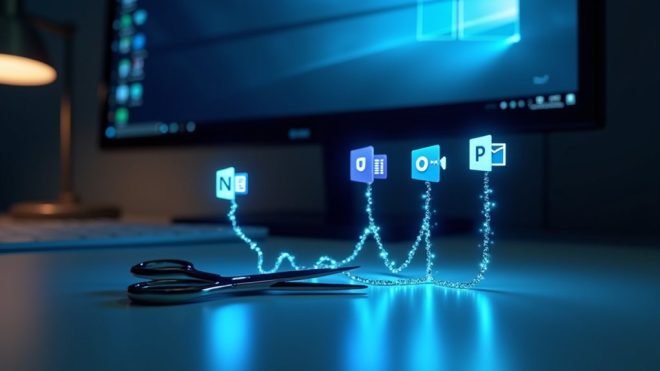Windows 11’s latest update bundles Copilot, Teams, and Outlook as pre-installed features, but users are fighting back against the bloat. Tech-savvy individuals now employ PowerShell commands and third-party tools like WinScript to strip away unwanted applications and background processes. As Microsoft pushes for feature-rich experiences, privacy-conscious users leverage tools from Chris Titus Tech and others to maintain lean, efficient systems. The battle between corporate vision and user preference continues to evolve.

Windows 11’s bloatware problem continues to frustrate users as Microsoft‘s latest operating system ships with more pre-installed apps and background processes than ever before. The inclusion of Copilot, Teams, and Outlook as default installations has particularly irked tech-savvy users who find themselves battling an expanding arsenal of unwanted software that quietly consumes system resources. These applications often function as unwanted trialware that persistently push for paid subscriptions and upgrades.
Like uninvited houseguests who overstay their welcome, these pre-installed apps have a knack for hanging around despite clear signals they’re not wanted. Copilot, Microsoft’s AI assistant, exemplifies this trend – integrated deeply into the OS yet considered unnecessary bloat by many who prefer streamlined computing experiences. Teams and Outlook likewise stake their claim on system resources, running background processes even when users have no intention of firing up a video call or checking corporate email. Using WinScript’s desktop version, users can efficiently remove these unwanted applications while maintaining system stability.
The good news? Users aren’t powerless against this digital clutter. PowerShell commands and manual removal through Settings provide straightforward paths to evicting these resource-hungry applications. Third-party utilities like WinScript and Chris Titus Tech’s debloating tool have emerged as popular solutions, offering one-click options to sweep away unwanted apps while maintaining system stability. Think of them as Marie Kondo for your Windows installation – if it doesn’t spark joy (or productivity), out it goes.
But Microsoft’s persistence in pushing these apps raises eyebrows. With each system update, there’s a chance of bloatware resurrection – a digital game of whack-a-mole that tests users’ patience. The impact on system performance isn’t trivial either. Background processes from these pre-installed apps can nibble away at CPU cycles and memory, potentially turning your high-performance PC into something that moves more like a digital sloth.
Privacy concerns add another layer to the bloatware debate. Many of these pre-installed apps collect telemetry data, tracking user behaviour under the guise of improving services. Disabling these features through Group Policy Editor or third-party tools has become standard practice for privacy-conscious users who’d rather not share their computing habits with Redmond’s data centres.
Looking ahead, the Windows 11 25H2 build offers some hope with improved methods for managing Store packages in new user profiles.
Nevertheless, the core issue remains: Microsoft’s vision of a feature-rich, connected Windows experience often clashes with users’ desires for a lean, efficient operating system. Until this fundamental disconnect is addressed, the movement between bloatware and its removal tools will likely continue – an indication of the ongoing tension between corporate software ambitions and user preferences for digital minimalism.
Final Thoughts
Microsoft’s recent initiative to clean up Windows 11 by streamlining applications like Copilot, Outlook, and Teams represents a notable change in their approach to bloatware. This transition aims to provide users with a more efficient operating system, ultimately leading to improved performance and lower storage requirements. North Lakes PC Repairs can assist you in optimizing your Windows 11 experience by helping you manage and customize your software needs. For personalized support and to learn more about how we can help, please visit our contact us page today!

